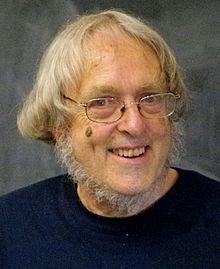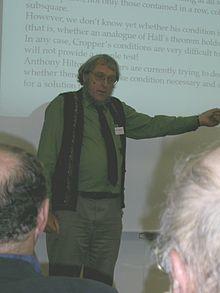Peter J. Cameron | |
|---|---|
 | |
| Born | 23 January 1947 (age 74) |
| Nationality | Australian |
| Alma mater | University of Queensland University of Oxford |
| Awards | Whitehead Prize, 1979 Euler Medal, 2003 Forder Lecturer, 2008[1] |
| Scientific career | |
| Fields | algebra, group theory, combinatorics, coding theory, model theory |
| Institutions | University of St Andrews Queen Mary, University of London University of Oxford |
| Doctoral advisor | Peter M. Neumann |
| Doctoral students |
|
Peter Jephson Cameron FRSE (born 23 January 1947) is an Australian mathematician who works in group theory, combinatorics, coding theory, and model theory. He is currently half-time Professor of Mathematics at the University of St Andrews, and Emeritus Professor at Queen Mary University of London.
Cameron received a B.Sc. from the University of Queensland and a D.Phil. in 1971 from University of Oxford, with Peter M. Neumann as his supervisor.[3] Subsequently, he was a Junior Research Fellow and later a Tutorial Fellow at Merton College, Oxford, and also lecturer at Bedford College, London.
Work
Cameron specialises in algebra and combinatorics; he has written books about combinatorics, algebra, permutation groups, and logic, and has produced over 250 academic papers.[4] He posed the Cameron–Erdős conjecture with Paul Erdős.
Honours and awards
He was awarded the London Mathematical Society's Whitehead Prize in 1979 and is joint winner of the 2003 Euler Medal. In 2018 he was elected a Fellow of the Royal Society of Edinburgh.[5]

Books
- with J H van Lint: Graph Theory, Coding Theory and Block Designs (1975)
- Parallelisms of Complete Designs (1976)[6]
- Oligomorphic Permutation Groups (1990)
- with J H van Lint: Designs, Graphs, Codes and their Links (1991)
- Combinatorics: Topics, Techniques, Algorithms (1994)
- Sets, Logic and Categories (1999)
- Permutation Groups (1999)
- Introduction to Algebra (first edition) (1998)
- Introduction to Algebra (second edition) (2008)
Notes
- ^ LMS-NZM Forder and Aitken Lectureships
- ^ Peter Camerons DPhil/PhD students
- ^ Peter M. Neumann at the Mathematics Genealogy Project
- ^ Recent publications of Peter J. Cameron
- ^ "Professor Peter Jephson Cameron FRSE - The Royal Society of Edinburgh". The Royal Society of Edinburgh. Retrieved 14 March 2018.
- ^ Kantor, William M. (1978). "Review: Parallelisms of complete designs, by Peter J. Cameron". Bull. Amer. Math. Soc. 84 (3): 451–453. doi:10.1090/s0002-9904-1978-14489-9.
References
External links
- Home page at Queen Mary University of London
- Home page at University of St Andrews
- Peter Cameron's 60th birthday conference
- Theorems by Peter Cameron at Theorem of the Day
- Peter Cameron's blog
- Peter Cameron at the Mathematics Genealogy Project